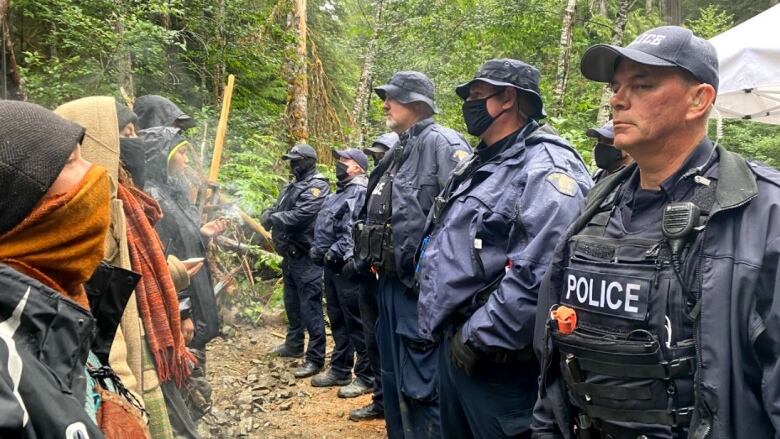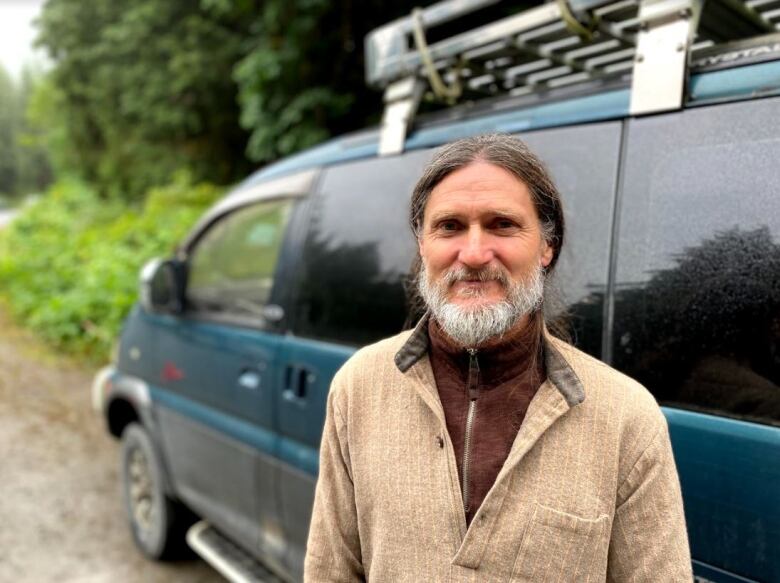Fairy Creek activists say RCMP more aggressive when no observers present, question police accountability
Police denied journalists vehicle access to Fairy Creek blockades last week; told them to walk 7 kilometres

On a recentafternoon in the Fairy Creek watershed on Vancouver Islanda group of about 40 old-growth logging demonstrators stood face to face with a solid line of silentRCMP officers at the River Campblockade northeast of Port Renfrew.
A demonstrator, acting as a liaison with police, informed the groupthe police would be forcing themup the roadin order to access a tripod structureto which a protester was harnessed.Many of the protesters willingly dispersed.
Police enforcement that afternoon, Aug. 26,was relatively calm, measured, and based largely on communication.
It's a contrast from theaggressive enforcementtactics police have used against the protesters,such as their use of pepper spray on Aug. 21, which was recorded and shared on YouTube the same day.
The RCMP began enforcing a Supreme Court-ordered injunction barring protesters from obstructing logging activities in the Fairy Creek watershed in May.Protesters have been blocking lumber company Teal Jones from accessing old-growth trees in theFairy Creek watershedfor a year.

Since enforcement began, RCMP have arrested 824 people, 72 of whom were previously arrested.
Demonstrators told CBCthat police tactics were less aggressive in the immediate aftermath ofthe pepper spray video, but said officers have more recently revertedbacktoaggressive enforcement methods, particularly when journalistsand other observers aren't present.
Protest actions dictate police response, says RCMP
As of Aug.25, the Civilian Review and Complaints Commission for the RCMP said21 of 91 complaints it has received about the conduct of police enforcement at Fairy Creek fall within its mandate and will be investigated.
RCMP spokesperson Sgt. Chris Manseau said the police commander ultimately decides enforcement tactics.
"It's the actions of the protesters that dictate the actions of the police," said Manseau. "[On Aug. 26] they were calm, they were quiet. Obviously, our members would much prefer to take those routes."

Several activists spoke to CBC News on the condition they be identified only by nicknames because they face potential prosecution.
Momo, one of the demonstrators,said that after the pepper-spray video was published"[the police]let everybody [at the blockade]come close enough so that we could see the arrests and extractions."
Now, he said, they're largely back to keeping everyone, including the media, at a distance.
Journalists told to walk 7 km to blockades
On the morning of Aug. 26, at a police checkpoint northeast of Port Renfrew, anofficer who identified himself as a media relationsofficer, andwas later identified by the RCMP as Cpl.Ian Sim, told journalists including the CBCthey had no choice but to hike sevenkilometres to access a blockade.
Cpl. Sim told journalists the RCMP would not be driving them up in a police vehicle, as they normally would, due to logistical and liability concerns. He also said journalistswouldn't be allowed to drive themselves up, as they have in the past, explainingitwas his first week working in the area, and he was following orders.
CBC journalists carriedheavy camera equipment up the Granite Main logging road while it rained around 350 metres in elevation to witness RCMP enforce the injunction.Once at the site,officers allowed CBCNews to move inand speak with demonstrators at the site of arrests.
This comes after public concernshave arisen about how police actions at the Fairy Creek blockades could be limiting freedom of the press.

Earlier this month, the B.C. Supreme Court ruled that the RCMP's media exclusion zones and checkpoints are unlawful, given they unreasonably limit press freedoms, and that a "principal purpose of the injunction is to maintain public access to roads in the injunction area."
Sgt. Manseau apologized for the incident, and saidhe didn't know details so he could not comment further. Hesaid journalists should have full vehicle access to the blockades because it "benefits everyone."
Police more aggressive when not being observed, allegesprotester
A demonstratorwho identified herself asSunshine said police tactics "have changed several times" depending on which group of officers are there, adding they now tend to "do their dirtiest work" when they know the media and legal observers aren't present.
Sunshinesaid in the past week one group of all-new officers was "very aggressive," particularly with Indigenous women and other people of colour.
"This type of violence is not new," Sunshine said. "A lot of people have woken up to what's happening because they saw it last weekend."
Indigenous demonstratorRaven said she and another protester were "brutally attacked" by police last weekwhen she and her friendexpressed the need to urinate. The CBCcould not verify thisclaim after sending it to the RCMP.

Sgt. Manseausaid the RCMP doesnot target anyone based on their race.
It's "very concerning that allegations are being made in very general terms," he said, noting police actions are "well-documented, including the use of body-worn cameras," though he said not every officer at the blockades wears one.
Manseau said police actions are taken "regardless of attendance by any other observers."
Other protesters told CBC they were exhausted and feelingresidual trauma from the violence they've experienced at the blockades since the pepper spray incident.
PacheedahtElder Bill Jones, afigurehead for the old-growth logging protests, told CBCthe police "attack the [demonstrators] when they feel they're at their weakest" and suspects police willbecome more aggressive in the coming weeks. He said he expects support forprotesters will strengthen, despite the possibility that a number ofactivists will return to school in September.
With files from Kathryn Marlow, Bethany Lindsay, David P. Ball, and the Canadian Press












_(720p).jpg)


 OFFICIAL HD MUSIC VIDEO.jpg)
.jpg)



























































































